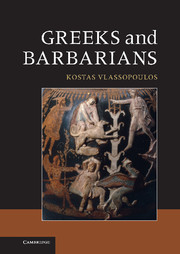Book contents
- Frontmatter
- Contents
- List of Maps and figures
- Acknowledgements
- Note to the reader
- List of Abbreviations
- 1 Introduction
- 2 The Panhellenic world and the world of empires
- 3 The world of networks and the world of apoikiai
- 4 Intercultural communication
- 5 The Barbarian repertoire in Greek culture
- 6 Globalisation and glocalisation
- 7 The Hellenistic world
- 8 Conclusions
- Bibliography
- Index locorum
- Index
6 - Globalisation and glocalisation
Published online by Cambridge University Press: 05 June 2013
- Frontmatter
- Contents
- List of Maps and figures
- Acknowledgements
- Note to the reader
- List of Abbreviations
- 1 Introduction
- 2 The Panhellenic world and the world of empires
- 3 The world of networks and the world of apoikiai
- 4 Intercultural communication
- 5 The Barbarian repertoire in Greek culture
- 6 Globalisation and glocalisation
- 7 The Hellenistic world
- 8 Conclusions
- Bibliography
- Index locorum
- Index
Summary
The Introduction sketched two fascinating conundrums in the study of Greek–Barbarian relationships. The first was the peculiar way in which Greek culture filtered its interaction with and debts to non-Greek cultures through the construction of a Barbarian repertoire. The second was the significant impact of Greek culture during the archaic and classical periods on many cultures and societies of the eastern Mediterranean. How are we to explain the fact that the Greek periphery influenced so deeply the much larger, older, wealthier and more powerful world of the empires of the East? Chapter 5 dealt with the first conundrum; this one will deal with the second. As the Introduction suggested, the best way to understand our conundrum is by situating it within the processes of globalisation and glocalisation in the ancient Mediterranean. We shall therefore examine how Greek culture was part of the processes of globalisation and how non-Greek communities around the Mediterranean glocalised various aspects of it in diverse ways. The following discussion of glocalisation and globalisation is largely focused on archaeological, numismatic and epigraphic evidence; the reason for this selection is not merely their intrinsic interest, but the fact that the non-Greek literatures of the archaic and classical periods have almost completely vanished, with the obvious exception of the Jewish texts included in the Old Testament.
- Type
- Chapter
- Information
- Greeks and Barbarians , pp. 226 - 277Publisher: Cambridge University PressPrint publication year: 2013

